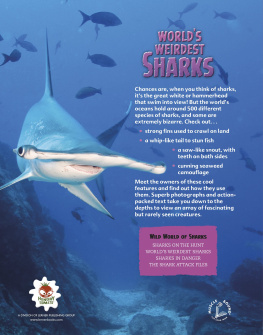Juliet Eilperin - Demon Fish: Travels Through the Hidden World of Sharks
Here you can read online Juliet Eilperin - Demon Fish: Travels Through the Hidden World of Sharks full text of the book (entire story) in english for free. Download pdf and epub, get meaning, cover and reviews about this ebook. year: 2011, publisher: Pantheon, genre: Romance novel. Description of the work, (preface) as well as reviews are available. Best literature library LitArk.com created for fans of good reading and offers a wide selection of genres:
Romance novel
Science fiction
Adventure
Detective
Science
History
Home and family
Prose
Art
Politics
Computer
Non-fiction
Religion
Business
Children
Humor
Choose a favorite category and find really read worthwhile books. Enjoy immersion in the world of imagination, feel the emotions of the characters or learn something new for yourself, make an fascinating discovery.

- Book:Demon Fish: Travels Through the Hidden World of Sharks
- Author:
- Publisher:Pantheon
- Genre:
- Year:2011
- Rating:4 / 5
- Favourites:Add to favourites
- Your mark:
- 80
- 1
- 2
- 3
- 4
- 5
Demon Fish: Travels Through the Hidden World of Sharks: summary, description and annotation
We offer to read an annotation, description, summary or preface (depends on what the author of the book "Demon Fish: Travels Through the Hidden World of Sharks" wrote himself). If you haven't found the necessary information about the book — write in the comments, we will try to find it.
Demon Fish: Travels Through the Hidden World of Sharks — read online for free the complete book (whole text) full work
Below is the text of the book, divided by pages. System saving the place of the last page read, allows you to conveniently read the book "Demon Fish: Travels Through the Hidden World of Sharks" online for free, without having to search again every time where you left off. Put a bookmark, and you can go to the page where you finished reading at any time.
Font size:
Interval:
Bookmark:

Also by Juliet Eilperin
Fight Club Politics:
How Partisanship Is Poisoning the House of Representatives

Copyright 2011 by Juliet Eilperin
All rights reserved. Published in the United States by Pantheon Books, a division of Random House, Inc., New York, and in Canada by Random House of Canada Limited, Toronto.
Pantheon Books and colophon are registered trademarks of Random House, Inc.
Library of Congress Cataloging-in-Publication Data
Eilperin, Juliet.
Demon fish : travels through the hidden world of sharks / Juliet Eilperin.
p. cm.
eISBN: 978-0-307-37979-5
1. Sharks. 2. SharksAnecdotes. I. Title.
QL638.9.E43 2011 597.3dc22 2010030264
www.pantheonbooks.com
Jacket photograph Hermanus Backpackers
Jacket design by Brian Barth
v3.1
To my mother, Sophie C. Cook, my father, Stephen F. Eilperin,
and my husband, Andrew Light, all of whose
parenting skills put sharks to shame
The sharks are almost glowing as they pass by, gently nudging each other as they jostle for the bloody pieces of barracuda that the ichthyologist Samuel Sonny H. Gruber has thrown in the sea minutes before. Their whitish underbellies reflect the beaming Caribbean sun above. They are shimmering, even as their steel gray upper bodies dull the light and provide them a measure of camouflage. The pearly glow and stealth of these creatures confirm what I have long suspected: sharks operate in a separate universe.
They glide, these lemon sharks, Caribbean reef sharks, blacknose sharks, and nurse sharks. But unlike the pretty tropical fish beside them, which travel in neat, compact schools, these sharks swoop in from all directions. They display no attempt at coordination: each one is out for itself.
Before I enter the water, a researcher warns me I should rely on peripheral vision to make sure I can sense whether a shark is approaching me from the side. Unlike a character in the movies, I cannot scan the surface for the telltale fin that juts out right before the cinematic climax: sharp points appear from an array of angles, making such clear distinctions impossible. While Im no expert in scuba maneuvers, I do my best to keep moving in this rapidly shifting underwater feeding frenzy so as not to collide with one of the sharks by accident. I am more alert than a highway driver checking her blind spot while cruising at seventy-five miles per hour. Its as if I have crashed an amazing, bizarre party with several friends and need to be on my best behavior at all times, for fear of offending our intriguing but menacing hosts.
This is the first time Ive entered the surreal world of sharks. Its the summer of 2005 off the shores of Bimini, a small island fifty miles from the Florida coast. I am viewing sharks as a journalist, venturing out with several researchers from the Bimini Biological Field Station. In the Bahamas this pastel-colored institution is better known by its longtime nickname, the Shark Lab. This moniker gives it the same casual feel as the rest of the island: many locals are bemused by the fresh-faced, budding marine biologists who rotate in and out of its cramped quarters with clocklike regularity. The entire enterprise seems more like a Real World episode than a real science mission. In Grubers boat Im surrounded by about a dozen tannedin some instances pierced and tattooedtwentysomethings from various countries in skimpy bathing suits. They all appear unfazed at the prospect of taking a dip with creatures that terrify most sane swimmers. These young men and women dont appear to be geeks who have temporarily traded in their polyester white lab coats for black neoprene wet suits: theyre casually chatting about their evening plans as we prepare to enter the water, not arguing about the finer features of elasmobranchsa subclass within Chondrichthyesor shifting water currents.
Unlike my companions, however, I cannot adopt the same casual pose this summer afternoon. I have painstakingly developed several rationales to keep myself from panicking before scooting off the boat at Triangle Rocks, a gathering place for several shark species:
- All the biologists on this trip have an interest in keeping me alive, since theyll never get their message out if I die here and fail to publish my work.
- Im among the skinniest folks on this outing, so surely Im less appetizing than the chunkier divers.
- As long as I act as if I know what Im doing, and dont deliberately pick fights with these hulking animals, theyll leave me alone.
Calm for the moment, I jump into the water without much fuss and focus on keeping my wits about me as I slip down below the surface. But my feigned nonchalance dissipates the moment my eyes open, as I see dozens of the kinds of mythical creatures that have dominated the human psyche for millennia, long before Jaws hit American movie screens in 1975. Swarming the area looking for food, the sharks come within a few feet of where I am swimming. I dont need to worry about being eaten, it turns out, much to my relief. They are more focused on their catered mealtime than on the human in their midst. Mingling in this congregation are some nurse sharksamong the most harmless sharks divers typically encounterwhich only latch onto humans if theyre deliberately provoked, in which case their jaws can remain clamped on for some time. But for the most part these are not namby-pamby sharks, the kind that pose no harm. So I gently circle these ancient creatures, thrilled at the idea that Im surviving on their turf.
Humansregardless of their culture, era, or geographic locationhave been fascinated with sharks from the beginning of time. They predate us by so many hundreds of millions of years but are a remote cohabitant of this earth rather than a familiar one. Sharks were swimming our seas before the continents took their current shape, when oceans covered Bolivia, South Africa, and Montana. Despite their considerable numbers, they remain elusive. Many of them dont travel in schools: they roam the seas on their own, as adventurers. Their murderous power, their ancient lineage, their aloofnessall these attributes have given them a place within human culture where they are simultaneously worshipped and loathed. Its an unenviable position, one that is helping propel their rapid decline.
Historically, sharks represented gods in ancient societies, where their power to destroy us demanded respect. Sharks played a role in these cultures rituals and their creation stories, helping explain humans relationship to the natural world. In Fiji the people had a shark god called Dakuwaqa that was seen as the direct ancestor of their high chiefs; the Japanese paid homage to a shark they considered the God of Storms; the Hawaiians still view the shark as an animal deity that serves as their most powerful guardian angel, aumkua. As these societies have modernized, they have forgotten why they prized sharks in the first place.
There are still some places left around the globe, like a few small island villages in Papua New Guinea, where this sort of worldview continues to hold sway. In these remote outposts a select group of men are trained in the ritual of shark calling: after performing elaborate rituals, they hunt them by hand, bring them home for feasts, and end up earning more respect than anyone else. But even here relations between humans and sharks have undergone a shift, because it is shark conquerors who hold a special place in these societies. Worshipping sharks alone is no longer enough.
Font size:
Interval:
Bookmark:
Similar books «Demon Fish: Travels Through the Hidden World of Sharks»
Look at similar books to Demon Fish: Travels Through the Hidden World of Sharks. We have selected literature similar in name and meaning in the hope of providing readers with more options to find new, interesting, not yet read works.
Discussion, reviews of the book Demon Fish: Travels Through the Hidden World of Sharks and just readers' own opinions. Leave your comments, write what you think about the work, its meaning or the main characters. Specify what exactly you liked and what you didn't like, and why you think so.







